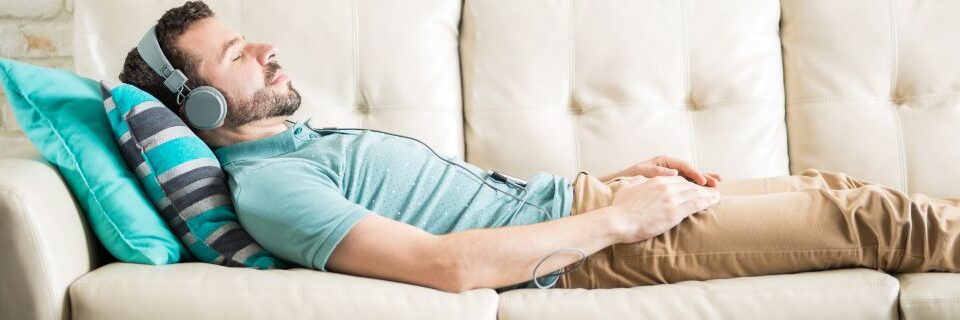
Do Sleep Aids Help Sleep Apnea? What You Need to Know

Sleep Paralysis: Conquering the Demons
Table of Contents
If you struggle to get enough sleep at night, various types of sleep therapy are available. It is important to develop a routine and practice good sleep hygiene, but did you know a self-hypnosis app can help? You can quiet your mind and relax your body with sleep hypnosis.
What Causes a Lack of Deep Sleep?
Insomnia is a disorder that makes it hard to fall or stay asleep. Severity varies, and symptoms range from temporary to chronic. Common causes include poor sleep hygiene, sleep disorders. physical illnesses, mental health disorders, erratic schedules, stress, age, genetics and side effects of medications.
Why Cannot I Sleep At Night?
It may be hard to get to sleep if you drink too much caffeine, have a bad day, or do not relax before going to bed. Jet lag disturbs the body’s circadian rhythm, and even small amounts of blue light can interfere. Aches and pains from a workout or tense muscles from hunching over a computer may be the culprits. When you are not in optimal health, the quality of your sleep declines.
Proven Tips to Sleep Better at Night
What Are the Suggested Tips to Get a Better Night Sleep? Sleep therapy uses cognitive behavioral therapy to teach people how to sleep better by noticing thoughts and feelings that contribute to insomnia. It may also include exercises or activities to relax the body. But there are many more types of therapy you can use, such as hypnotherapy.
Try these 15 tips to sleep better at night:
- Use an app that guides you through hypnosis for sleep.
- Go to bed and get up at the same time every day, including Saturday and Sunday.
- Exercise or engage in other kinds of physical activity every day.
- Go to bed in time to sleep for seven or eight hours.
- Establish a bedtime ritual that reminds your body it is time to go to sleep.
- Go to bed in an uncluttered bedroom, preferably at a temperature around 65 degrees.
- Turn off electronic devices at least 30 minutes before going to bed.
- Wait until you are sleepy to go to bed.
- If you cannot fall asleep, get out of bed until you are sleepy.
- Do not use your bedroom for an office or TV room.
- Eat a plant-based diet with high-fiber foods and lean meats.
- Avoid exposure to bright light before bedtime.
- Reduce the amount of fluids before bedtime.
- Spend time in nature. Studies show it helps you sleep better.
- Avoid alcohol, caffeine and heavy meals before bedtime.
How To Sleep Better With Sleep Hypnosis Audio
Sleep hypnosis for insomnia can be helpful when other proven tips to sleep better at night do not work. According to Penn Medicine, a teaching hospital at the University of Pennsylvania in the United States, hypnosis can improve deep sleep by up to 80%, increasing morning alertness and energy. It is also effective for conditions, such as depression and anxiety, that contribute to insomnia. Using sleep hypnosis to fall asleep promotes optimal health and is an effective form of sleep therapy.
Fall Asleep Fast With Self-Hypnosis
A 2014 study at the University of Zurich showed that hypnosis can promote good sleep. Researchers used an electroencephalogram to measure sleep waves during a series of midday naps in 70 participants and found an increase in slow-wave sleep. When they received hypnotic suggestions for deep sleep, their slow sleep waves increased by 81%. The time they spent awake decreased by 67%. Scientists think the brain restores itself and consolidates memories during this sleep cycle.
Additional research suggests that hypnosis is a promising treatment for sleep disorders and cites the need for further studies. There is also evidence that hypnotherapy for anxiety and other mental and physical disorders is effective.
UpNow Can Help
Visit UpNow to find out how hypnosis can help you overcome insomnia and other related issues. Our apps and online resources get to the root of your sleep problems and treat the causes. Try our plans free for a limited time to fall asleep fast with sleep hypnosis.
UpNow Health only uses high-quality sources, including peer-reviewed articles, to support the facts within our articles. All our articles are reviewed by experts to ensure that our content is accurate, helpful, and trustworthy.
1. Chamine, I., Atchley, R., & Oken, B. S. (2018). Hypnosis Intervention Effects on Sleep Outcomes: A Systematic Review. Journal of clinical sleep medicine : JCSM : official publication of the American Academy of Sleep Medicine, 14(2), 271–283. https://doi.org/10.5664/jcsm.6952
2. Kenneth Wright, Ph.D., professor, integrative physiology, University of Colorado, Boulder; Phyllis Zee, M.D., Ph.D., director, Center for Circadian and Sleep Medicine, Northwestern University Feinberg School of Medicine, Chicago; Feb. 2, 2017, Current Biology, online
3. Cordi, M. J., Schlarb, A. A., & Rasch, B. (2014). Deepening sleep by hypnotic suggestion. Sleep, 37(6), 1143–1152F. https://doi.org/10.5665/sleep.3778












